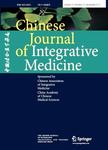Bear Bile Powder Inhibits Growth of Hepatocellular Carcinoma via Suppressing STAT3 Signaling Pathway in Mice
Bear Bile Powder Inhibits Growth of Hepatocellular Carcinoma via Suppressing STAT3 Signaling Pathway in Mice作者机构:Academy of Integrative MedicineFujian University of Traditional Chinese MedicineFuzhou(350122)China Fujian Key Laboratory of Integrative Medicine on GeriatricsFujian University of Traditional Chinese MedicineFuzhou(350122)China
出 版 物:《Chinese Journal of Integrative Medicine》 (中国结合医学杂志(英文版))
年 卷 期:2020年第26卷第5期
页 面:370-374页
核心收录:
学科分类:1008[医学-中药学(可授医学、理学学位)] 1006[医学-中西医结合] 100602[医学-中西医结合临床] 10[医学]
基 金:Supported by the Developmental Fund of CHEN Ke-ji Integrative Medicine(No.CKJ2013009)
主 题:bear bile powder Chinese medicine hepatocellular carcinoma signal transducer and activator of transcription 3 pathway
摘 要:Objective: To evaluate the inhibitory effect of bear bile powder(BBP) on hepatocellular carcinoma(HCC) growth in vivo and investigate the underlying mechanisms. Methods: A HCC xenograft mouse model was developed by producing with huh7 cells. After 5 days following xenograft implantation, ten HCC xenograft mice were given intra-gastric administration with 10 mg/(kg·d) dose of BBP or saline for 3 weeks. Tumor growth in HCC xenograft mice was evaluated by measuring the tumor weight and volume. Cell apoptosis, proliferation or tumor angiogenesis were examined via immunohistochemical(IHC) staining for transferase-mediated deoxyuridine triphosphate-biotin nick end labeling(TUNEL), proliferating cell nuclear antigen(PCNA) or cluster of differentiation 31(CD31), respectively. Phosphorylation of signal transducer and activator of transcription 3(STAT3) were determined by Western blot. The m RNA and protein expressions of Bcl-2, Bax, Cyclin D1 and Cyclin-dependent kinase 4(CDK4) in HCC tumor tissues were respectively determined by reverse transcription polymerase chain reaction(RT-PCR) and Western blot. The protein expression of vascular endothelial growth factor A(VEGF-A) in tumor tissues was examined by IHC staining. Results: BBP treatment led to a significant decrease on tumor volume and tumor weight in HCC mice(P0.05) and had no effect on the change of body weight. In addition, BBP profoundly promoted cell apoptosis, inhibited cell proliferation and intratumoral microvessel density in HCC tumor tissues(P0.05). Moreover, BBP treatment remarkably suppressed the STAT3 phosphorylation and modulated the expression of critical target genes including Bcl-2, Bax, Cyclin D1, CDK4 and VEGF-A in HCC mice. Conclusion: BBP exerts its anti-cancer activities via suppressing STAT3 signaling pathway and affecting multiple intracellular targets.



